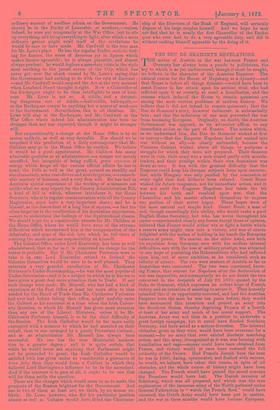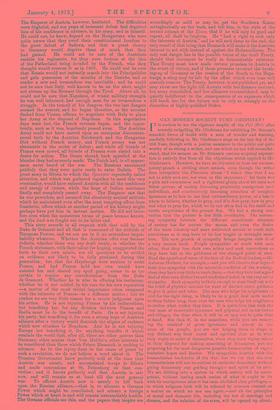always prudent ; he would deplore a nronetary crisis in
the style Germany has always been a puzzle to politicians, the War Office where indeed his administration has been far from becoming European. Originally, no doubt, the Austrian stronger than any one expected, though it might be stronger Government was opposed, as its advocates affirm, to any still. immediate action on the part of France. The notion which, But unquestionably a change at the Home Office is by no as we understand him, the Due de Gramont wished at first means unlikely, as well as very desirable. Nor should we be to convey—that the Emperor Napoleon had not rushed into surprised if the prediction of a daily contemporary that Mr. war without an ally—is clearly unfounded, because the Childers may go to the Home Office be verified. We believe Viennese Cabinet wished, above all things, to postpone a it would be a good appointment. Mr. Childers has many struggle for which they were not prepared. Their finances admirable qualities as an administrator,—a temper not merely were in ruin, their army was a mob armed partly with muzzle- unruffled, but incapable of being ruffled, great evenness of loaders, and their prestige within their own dominions was energy which keeps all the various official affairs he has in down at zero. It was with the greatest difficulty that the hand, the little as well as the great, pressed on steadily and Emperor could keep his German subjects from open insurrec- simultaneously, none over-driven and none forgotten,—a remark- tion, while Hungary was only pacified by the concession of able mastery of business, and a very firm will. He has had in every right that had hitherto been refused. Count Beust Australia special experience of the working of a measure not wished for future vengeance, not for immediate action, and it unlike what we may expect for the County Administration Bill, was not until the Emperor Napoleon had taken the bit .a kind of bill in which, whoever introduces it, the Home between his teeth and resolved upon war, that the Secretary, who is in regular communication with all the County Chancellor and his master allowed themselves to express Magistrates, must have a very important share ; and he is any portion of their secret hopes. These hopes were of himself, as the descendant of a long line of squires,—a fact too the most natural and simple kind. Count Beust, a man of often forgotten in the recollection of his Australian experiences, real, though exceedingly thin ability, who would make a good —sure to understand the feelings of the Squirarchical classes. English Home Secretary, but who has never throughout his We should hope for a considerable success for Mr. Childers at career comprehended clearly any forces except those of opinion, the Home Office, where he would have none of the extreme believed that France would either win or fight a battle which difficulties which encountered him in the reorganisation of the a reserve army might turn into a victory, and was of course Admiralty, and none of the risk into which he fell there of delighted with the notion of holding in his hands the European The Emperor of Austria, however, hesitated. The difficulties were frightful, and ten years of incessant defeat had deprived him of his confidence in advisers, in his army, and in himself.
He could not, he knew, depend on the Hungarians, who were quite aware that they owed their constitutional freedom to the great defeat of Sadowa, and that a great victory in Germany would deprive them of much that they had gained. Ile could not be sure of the Austrians outside his regiments, for they were furious at the idea of the Fatherland being invaded by the French, who they thought would overrun it as in 1806. He could not be sure that Russia would not instantly march into the Principalities and gain possession of the mouths of the Danube, and so render a new and tremendous war inevitable ; and he could not be sure that Italy, well known to be on the alert, might not stream up the Brenner through the Tyrol. Above all, he could not be sure that Napoleon, of whose military strength he was well informed, had enough men for so tremendous a struggle. In the tumult of his dangers, the two last dangers seemed the nearest, and he began therefore, as the account flashed from Vienna affirms, to negotiate with Italy to place her Army at the disposal of Napoleon. In this negotiation days were lost, the French reverses began, and the oppor- tunity, such as it was, hopelessly passed away. The Austrian Army could not have moved upon an enterprise discounten- anced both by the Austrian Reichsrath and the Hungarian Diet without French money, and French money was not obtainable in the midst of defeat ; and while all friends of France were cowed, all friends of Prussia were elated into a desire for action. The Danes shrank back appalled at the blunder they had so nearly made. The Dutch had, to all appear- ance, never heard of the war. The Russians announced publicly that they were quite ready to enter Galicia. The great army in Silesia to which the Spectator repeatedly called attention, and which was gathered together to meet this very eventuality, would have entered Austria with all the confidence and energy of victors, while the hope of Italian assistance finally and completely passed away. The Emperor saw that he was powerless, and assumed the absolutely neutral attitude which he maintained even after the most tempting offers from Gambetta, offers which at another period of his history might perhaps have put him in instant motion. He did not inter- fere even when the monstrous terms of peace became known, and the duel was fought out to its bitter end.
This story accords in all respects with that told by the Duke de Gramont and all that is rumoured of the attitude of European Powers, and we can see in it no antecedent impro- bability whatever. Whether the Austrian offer ever became definite, whether there was any draft treaty, or whether the French statesmen, with their talent for hoping, exaggerated the facts to their own minds, are all questions to be settled on evidence not likely to be fully produced during this generation ; but that the Hapsburgs were anxious to assist France, and had France held her own would have assisted her and shared any spoil going, seems to us too certain to require any corroboration from the Duke de Gramont. Whether he is wise in offering his testimony, whether he is not misled by his care for his own reputation —a matter of the most trivial importance when compared with the interests of France—is a different matter ; but we confess we see very little reason for a severe judgment upon his action. He is not injuring France by his indiscretions, but benefiting her, for any division between Vienna and Berlin must be to the benefit of Paris. He is not injuring his party, but benefiting it, for even a strong hope of Austrian alliance after a victory would diminish the stigma of rashness which now attaches to Napoleon. And he is not injuring Europe but benefiting it, for anything benefits it which reminds the world that, after all, there are other powers than Germany, other armies than Von Moltke's, other interests to be considered than those which Prince Bismarck is seeking to advance. As to the injury done to the cause of peace by such a revelation, we do not believe a word about it. The Prussian Government knew perfectly well at the time that Austria was unsafe, and accumulated troops in Silesia and made concessions at St. Petersburg on that con- viction; and it knows perfectly well that Austria is safe now, and will remain so at least till the next general war. To affront Austria now is merely to fall back upon the Russian alliance,—that is, to alienate a German Power which might be conciliated, and attract a foreign Power which at heart is and will remain irreconcilably hostile. The German officials see this, and the papers they inspire are accordingly as mild as may be, pat the Southern Kaiser metaphorically on the back, and tell him, in the style of the second column of the Times, that if he will only be good and repent, all shall be forgiven. He "had a right to seek only the interests of Austria," and he will seek them to the end, the only result of that being that Bismarck will make it the Austrian interest to act with instead of against the Hohenzollerns. The only real danger lies in the possible terms of the draft Treaty, should that document be really, in demonstrable existence. That Treaty must have made certain promises to Austria in the event of victory, and if those promises involved the break- ing-up of Germany or the cession of the South to the Haps- burgs, a sting may be left by the affair which even time will scarcely remove. The Treaty, however, is not published yet, and may never see the light till Austria with her finances restored, her army remodelled, and her alliances reconsolidated, may be quietly indifferent to the consequences of an exposure which will teach her for the future not to rely so strongly on the discretion of highly-polished Dukes.











































 Previous page
Previous page